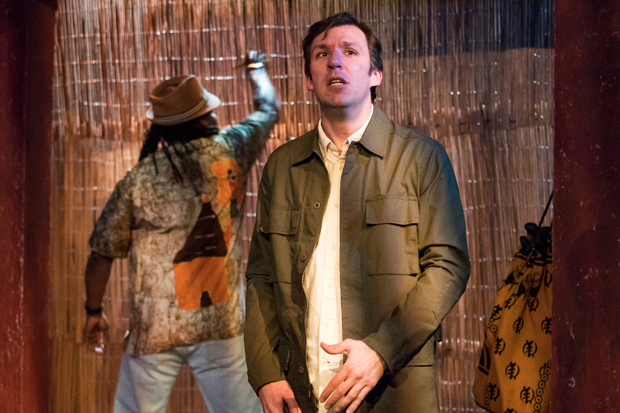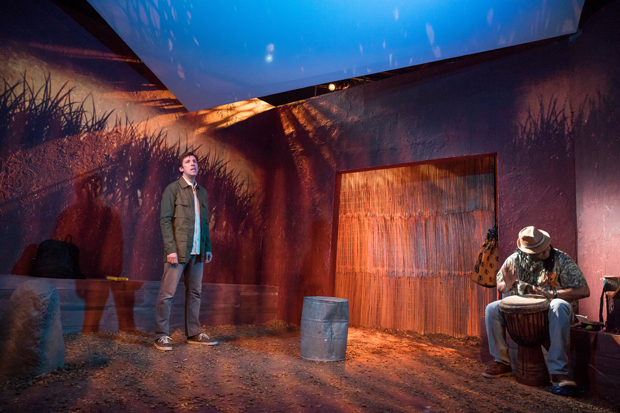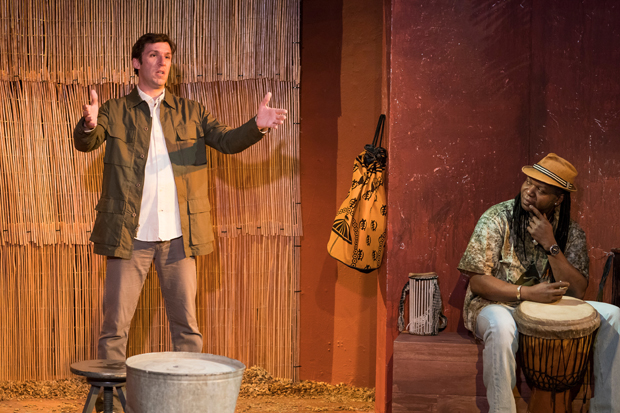Humans of Ohio Steal the Spotlight in Dogs of Rwanda
Sean Christopher Lewis tells the story of Rwandan genocide from an unlikely perspective: that of an upper-middle-class white American.

(© Ben Hider)
Before we hear about what David Zosia saw in Rwanda, we are subjected to a lengthy description of his vacation to Hawaii. It's a telling (if deadly) overture to Sean Christopher Lewis's Dogs of Rwanda, now making its New York debut at Urban Stages. Even as the story moves to less sunny shores, we cannot avoid the whiff of tourism that lingers around this play about genocide.
This may be because the protagonist of this monologue is little more than a tourist himself. Born and raised in Ohio, 16-year-old David (Dan Hodge) travels to Uganda on a missionary trip. He is ostensibly there to save souls, but he admits that he's really just following the beautiful Mary Jess. "This is going to be the greatest spring break of our lives," he declares. Famous last words: It's 1994 and their guesthouse is downriver from Rwanda, which has just descended into a bloodbath. When bodies start floating by, they decide to avoid the river, and when a young man named God's Blessing comes looking for his parents, they inexplicably decide to follow him back across the border to Rwanda.

(© Ben Hider)
"We f-f-f-follow him. D-d-deep within the w-w-woods," he purposefully stammers, reminding us of Bert Lahr in The Wizard of Oz. Hodge's tendency to telegraph each emotional beat betrays the contrivance of the script. His attempts to summon white-hot anger mostly leave us cold as we see the wheels turning in his head.
This may be a deliberate choice, since our narrator has had a lot of time to prepare his performance. Lewis frames his story as a confession: An adult David has penned a book reflecting on his time in Africa called Letters From the Red Hills. He decides to flee to Hawaii when he receives a copy of the book in the mail with a note attached from God's Blessing accusing him of printing "untruths." David has gathered us here tonight, we are told, to clear the air in the traditional Rwandan fashion.
Directors Frances Hill and Peter Napolitano create the atmosphere for this event with attractive simplicity. Frank J. Oliva's dirt-floor set conjures the African Great Lakes region, while Ryan Belock's tasteful projections subtly modify the scenery. West African drummer Abou Lion Diarra sits stage left, underscoring the play with heart-pounding percussion. He doesn't just limit himself to the musical instruments, inventively employing parts of the set as well. Diarra also comments on the story with his exaggerated facial expression, although it may not surprise you that the one person onstage actually from Africa remains silent throughout.

(© Ben Hider)
Unfortunately, all of the African characters discussed in Dogs of Rwanda come across as thinly drawn sketches. Even God's Blessing hides in the shadow of David's more fully formed presence. The result is that every time we think we're about to hear something revelatory about one of the greatest human-rights disasters of our time, David obnoxiously interrupts the story to marinate in the trauma of having witnessed it. His frequent digressions into his B-plot romance with Mary Jane are even more tiresome.
The issue of who has the right to tell the story of a tragedy is a dramatically compelling theme, one that was shrewdly explored by Branden Jacobs-Jenkins in Gloria. This play barely even questions David's dubious validity as the record-keeper of this atrocity. When it does fault him, it is for being too generous. It all leaves a false aftertaste that is very hard to wash down.








